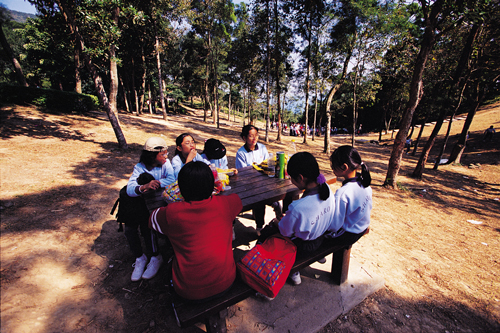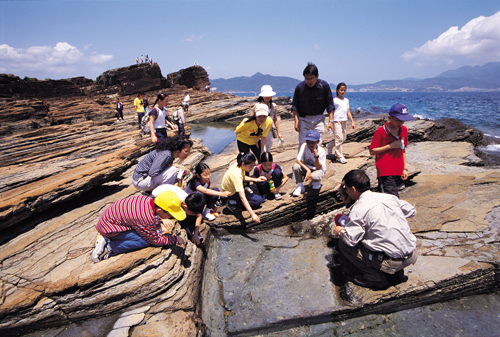|
The hiking trails and educational facilities in Country Parks offer diversified outdoor learning opportunities for students to explore our natural assets. To enjoy a safe and environmentally friendly excursion, teachers are advised to refer to the following Guidelines and give a briefing to students to arouse their awareness on hiking safety before conducting outdoor activities in country parks.
Safety
- Teachers are advised to refer to the "Guidelines on Outdoor Activities" issued by the Education Bureau before conducting outdoor activities with students in country parks.
- Please click here to download the "Country Park Hiking Safety Guidelines".
- Please click here to obtain online information about Mobile Coverage of Hiking Trails in Country Parks from the Office of the Communications Authority.
- Please click here for Hiking Trail information.
- Please click here for country parks barbecue sites, campsites and mountain bike trail information.
Countryside Code
- Do not vandalize natural features.
- Do not litter.
- Do not pollute water.
- Do not destroy vegetation, wildlife and their habitats.
- Do not light fire except in designated barbecue areas and campsites.
- Do not erect tent or shelter except in designated barbecue areas and campsites.
- Do not hunt or take away wildlife and plants.
- Do not feed wild animals.
- Do not cycle on non-designated mountain bike trail.
- Vehicular permit from AFCD / other relevant departments is required for driving within country parks.
- A permit is required from AFCD / other relevant departments if any sporting competition, public speech, commercial or fundraising activities is to be held in country parks.
- Respect villagers and do not damage private properties, crops and livestock.
- Respect other visitors and keep the noise down.
- Protect countryside and preserve the natural landscape.
Waste Reduction Guidelines for Conducting School Outdoor Activities
Country Parks are green treasures supporting a rich variety of wildlife. To conserve the environment, before conducting school outdoor activities such as field study, excursion, barbecue, camping and hiking in country parks, teachers shall encourage students to formulate waste reduction plan and adopt green habits.
Reduce Waste at Source
- Bring your own water bottle. Avoid buying bottled water.
- Use handkerchiefs instead of tissues.
- Bring reusable utensils and containers. Avoid using disposable products.
- Use containers for storing fresh food. Avoid packaged food.
- Bring sufficient food and spare food such as fruit. Avoid wastage of food.
Minimise the Impact of Waste on Wildlife
Remove food packaging and store food with a reusable container to save space and reduce weight of backpack. Thereby, reducing the amount of waste generated in the country parks.
ť
- Keep the hiking trails, barbecue sites and campsites clean.
- Do not litter or pollute water.
- Treasure natural resources. Conserve water and use tissues wisely.
- Avoid food packaging and other objects from falling into water bodies.
- Do not feed wildlife as it could change their habit.
Reuse
- Clean and reuse barbecue forks or put them into recycle bins in barbecue sites.
- Take the leftovers home to avoid food waste.
Proper Waste Disposal
- Use the sewage collection facilities in the site or bring your own bottle to take away the sewage. Do not pollute water.
- If food scrap collection bin is available, dispose of the food scraps properly according to the instructions on the notice. Do not drop unsuitable food scraps into the collection bin as it may affect the operation of the composting machine.
- Do not bury litter as it may be dug out by wildlife or become visible after exposure to the wind and rain.
- Take your litter home. Pack the litter and bring it to the recycle bin or refuse collection point for disposal.
ť
Take Your Litter Home
Green Tips for Campers
ť
Education Resources
"Nature in Touch" School Education Programme
ť
Telephone numbers of Country Park Ranger Offices/ Fire Control Centre
(Enquiry for hiking routes during office hours)
| Sai Kung |
2792 3730 |
| Hong Kong |
2552 7907 |
| Central |
2429 7247 |
| Lantau |
2988 8927 |
| West District |
2477 4896 |
| North District |
2662 5015 |
| Fire Control Centre |
2720 0777 (24 hour hill fire reporting hotline) |
ť
|

